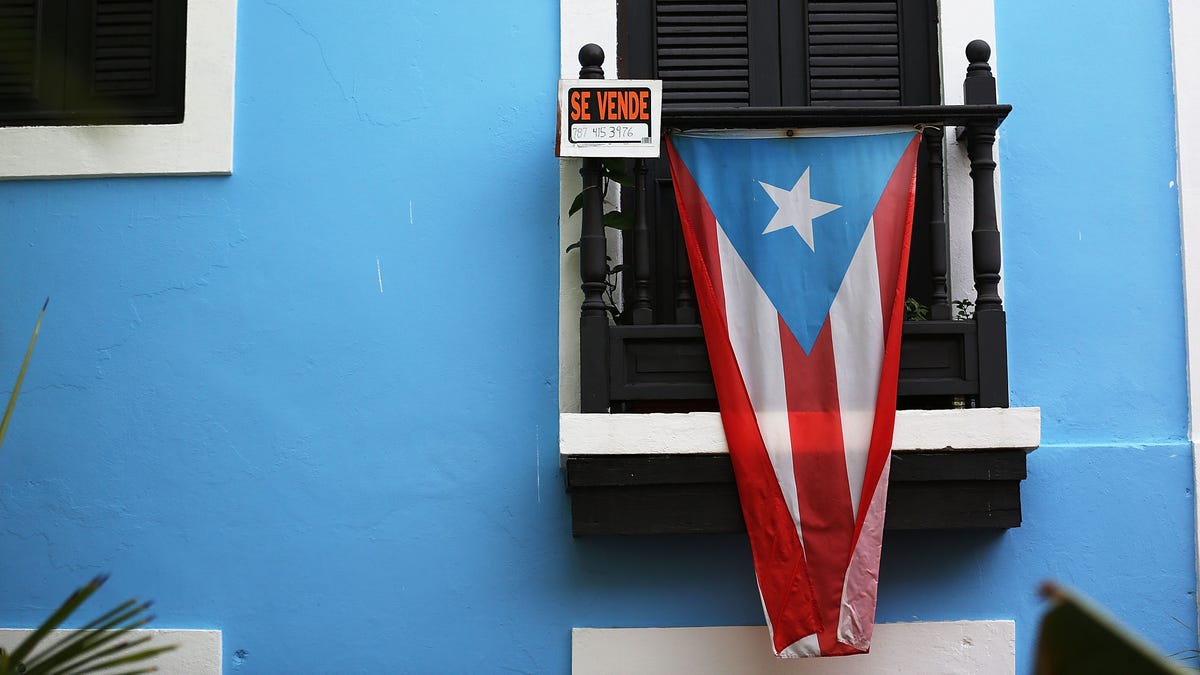
SAN JUAN, PUERTO RICO - JULY 01: A for sale sign is seen hanging from a balcony next to a Puerto Rican flag in Old San Juan as the island's residents deal with the government's $72 billion debt on July 1, 2015 in San Juan, Puerto Rico. Governor of Puerto Rico Alejandro Garc?a Padilla said in a speech recently that the people of Puerto Rico will have to make sacrifices and share the responsibilities to help pull the island out of debt. (Photo by Joe Raedle/Getty Images) (2015 Getty Images)
Help for debt-ridden Puerto Rico might be on its way.
In a breakthrough late Wednesday, a revised bill was introduced by House Republicans that would create a control board to help manage the U.S. territory’s financial obligations and oversee some debt restructuring.
It is seen as the first step toward ending Puerto Rico’s decade-long recession.
House Speaker Paul Ryan said in a statement Thursday that the plan, which comes after weeks of negotiations between House Republicans and the White House, is “the most responsible solution to the crisis because it gives Puerto Rico a path to real reform while protecting taxpayers.”
Treasury Secretary Jacob Lew expressed support for the legislation Thursday, with Lew calling the bill "a fair, but tough bipartisan compromise."
Rep. Sean Duff, who introduced the bill alongside Rep. James Sensenbrenner and Rep. Rob Bishop, who is the chairman of the Committee on Natural Resources, said in a statement: “Years of disastrous policies have completely wrecked Puerto Rico's economy. As a result, the island and its millions of American citizens face a humanitarian crisis.”
Puerto Rico has been mired in economic stagnation for a decade. More than 200,000 people have left Puerto Rico in the past five years, reducing the island's tax base. Financial problems grew worse as a result of setbacks in the wider U.S. economy, and government spending in Puerto Rico continued unchecked. Borrowing covered increasing deficits and bonds were sold on special terms.
According to the Wall Street Journal, the bill would offer Puerto Rico a legal option similar to bankruptcy and would not commit any federal money, a critical requirement from conservatives.
The goal of legislation is to reduce the island’s debt burden before it defaults on a $2 billion debt payment due July 1. Earlier this month, Puerto Rico missed most of a $422 million payment.
Under the federal bankruptcy code, Puerto Rico and other territories are excluded from bankruptcy protection in court that municipalities in the U.S. can seek.
The House Natural Resources Committee introduced a bill last month, but objections by both parties stymied any deals that would speed up aid to Puerto Rico.
Conservatives worried the plan might set a precedent for financially ailing states, while Democrats argued that the control board will be two powerful and favorable to creditors.
Utah Rep. Rob Bishop, committee chairman, led the negotiations and worked closely with Ryan, House Democratic leader Nancy Pelosi and the White House.
After opposing previous versions of the legislation, Pelosi voiced her support for the revised bill, saying it "achieved a restructuring process that can work."
Pelosi said she hopes the House will pass the bill quickly.
"We cannot shirk our responsibility to our fellow citizens in their hour of need," she said.
The Senate has not yet acted, and Senate Majority Leader Mitch McConnell, R-Ky., has said the chamber is waiting for the House to move first. But McConnell has provided input to Bishop's committee during negotiations, potentially smoothing the bill's eventual path through the Senate.
The new version has concessions to Republicans, Democrats and members who want to make sure that Congress has the utmost say in who sits on the board.
Disagreements over how the board would be appointed held up negotiations over the past week. Under the bill, President Barack Obama would select all but one of the board members from lists provided by congressional leaders. If Obama does not pick from those lists, the members must be confirmed by the Senate. Lawmakers have been working to ensure the bill is written so that Obama cannot easily reject those nominees and the board is chosen quickly.
The final bill also removes a provision that would have transferred federal land on the nearby island of Vieques to the government of Puerto Rico. That was a major concession to Democrats, whose votes may be needed when the bill reaches the House floor.
Puerto Rico's representative in Congress, Pedro Pierluisi, issued a statement after the bill was released that it is "moving in the right direction." He opposed previous versions of the legislation.
"I hope every member of Congress will bear in mind that the collapse of the bill could mean the collapse of Puerto Rico's government," said Pierluisi, who is running for governor of the territory. "History will judge us harshly if we do not act swiftly and wisely."
The new version does retain a provision to allow the Puerto Rican government to lower federal minimum wage requirements for some younger workers, which Democrats have objected to.
Under the legislation, the control board would require the Puerto Rican government to create a fiscal plan, including directing the territory to provide adequate funding for pensions. The island has underfunded public pension obligations by more than $40 billion.
Creditors have expressed concern that they would take a back seat to the pension obligations, while the Obama administration has pushed to make sure that pensions are also a priority.
The Associated Press contributed to this report.




